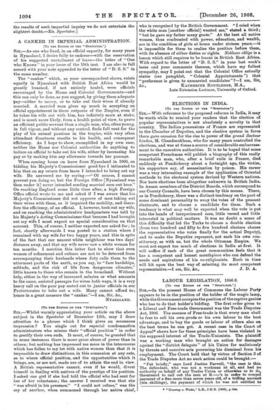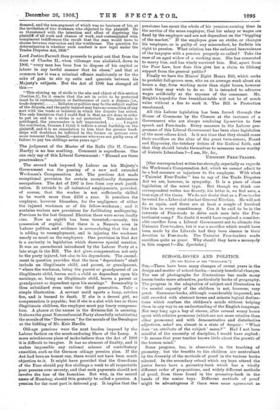LABOUR LEGISLATION, 1906-8.
[To THE EDITOR OF THE " SPECTATOR." J
SIR,—In the present House of Commons the Labour Party appears to be in the position of the bolder of the magic lamp, while the Government occupies the position of the captive genius who has to do that holder's bidding. The first order given to
a Liberal and Free-trade Government was the Trade Disputes Act, 1906. The essence of Free-trade is that every man shall be free to sell his own goods or his own labour to the best advantage, and to buy the goods or labour of others also on
the best terms he can get. A recent case in the Court of Appeal* shows how far these principles have been violated in the supposed interest of the Trade-Unionists. The plaintiff
was a working man who brought an action for damages against the 'district delegate" of his Union for maliciously by threats and coercive acts procuring his dismissal from his employment. The Court held that by virtue of Section 3 of the Trade Disputes Act no such action could be brought :—
"Pat briefly," says Lord Justice Farwell, "the case is this. The defendant, who was not a workman at all, and had no authority on behalf of any Trades Union or otherwise so to do, threatened to call out the men at R—'s in order to compel payment of a fine more than seven years old, of a trifling amount (ten shillings), the payment of which he was not entitled to * " Conway v. Wade," L.R., 2 K.B. (1908), p. SM. demand, and the non-payment of which was no business of his, at the invitation of two workmen who objected to the plaintiff. He so threatened with the intention and effect of depriving the plaintiff of all work and chance of work, and contemplated with complacent indifference the result that the man would have to choose between starvation and the workhouse. The question for determination is whether such conduct is now legal under the Trades Disputes Act, 1906."
Lord Justice Farwell then proceeds to point out that from the :time of Charles II., when villenage was abolished, down to 1906, "every man has been free to dispose of his capital or labour in any lawful manner that he chose," and that at common law it was a criminal offence maliciously or for the sake of gain to stir up suits and quarrels between his Majesty's subjects. But the Act of 1906 has changed all this:—
" This stirring up of strife is the aim and object of this section [Section 3], for it enacts that the act in order to be protected must be in contemplation or furtherance of such a dispute [i.e.,
trade dispute] Religion or politics may be the subject matter of the dispute, and the party injured may have no connection of any sort with the trade or industry in which the dispute has arisen. The only limitation that I could find is that an act done in order to put an end to a strike is not protected. The makebate is privileged, the peacemaker is left unprotected I regret the conclusion, because I think it inflicts a cruel hardship on the plaintiff, and it is no consolation to him that far greater hard- ships will doubtless be inflicted in the future on persons even more innocent than himself, —persons who were not guilty even of failure to pay ten shillings seven years ago." -
The judgment of the Master of the Rolls (Sir H. Cozens- Hardy) is no less scathing. Comment is superfluous. One
can only sky of this Liberal Government : "Blessed are these peacemakers."
The second task imposed by Labour on his Majesty's Government was the passing of a new and extended Workman's Compensation Act. The previous Act made exceptional provision for certain exceptionally dangerous
occupations. The Act of 1907 is free from any such justifi- cation. It extends to all industrial employments, provided, of course, that the worker is not sufficiently skilled to be worth more than £250 a year. It penalises the employer, however blameless, for the negligence of either
the injured workman or of his fellow-workman ; and it contains various new provisions for facilitating malingering. Previous to the last General Election there were seven deadly bins. Now an eighth has been invented,—nainely, the possession of capital. But there is a Nemesis even in Labour politics, and evidence is accumulating that the Act is adding to unemployment, and is injuring the workmen nearly as much as the employers. One provision in that Act is a curiosity in legislation which deserves special mention. It was an amendment introduced by the Labour Party at a late stage in the Bill. The Act gives compensation not only to the party injured, but also to his dependents. The amend- ment in question provides that the term " dependents " shall include an illegitimate child, and parent, or grandparent, "where the workman, being the parent or grandparent of an illegitimate child, leaves such a child so dependent upon his earnings, or, being an illegitimate child, leaves a parent or grandparent so dependent upon his earnings." Immorality is thus subsidised even unto the third generation. Take a simple illustration. A servant maid upsets a lamp, catches fire, and is burned to death. If she is a decent girl, no compensation is payable; but if she is a slut with two or three illegitimate children, the employer must pay heavy compensa- tion. A glance at the names in the division-list is amusing.
It shows the great Nonconformist Party cheerfully substituting the morals of the" Decameron "for the morals of the Decalogue at the bidding of Mr. Keir Hardie.
Old-age pensions were the next burden imposed by the Labour faction on the much-enduring Slave of the Lamp. A more mischievous piece of make-believe than the Act of 1908 it is difficult to imagine. • It has no element of finality, and it makes impossible any rational scheme of contributory annuities, such as the German old-age pension plan. If the Act had been an honest one, there would not have been much objection to it. It might have provided that the Guardians of the Poor should pay five shillings a week to all respectable poor persons over seventy, and that such payments should not involve the loss of the franchise. But why, in the sacred name of.Humbug, should this gratuity be called a pension. A pension for the most part is deferred pay. It implies that the
pensioner has spent the whole of his pension-earning time in the service of the same employer, that his salary or wages are fixed by the employer and are not dependent on the " higgling of the market." If the employee goes on strike, or changes his employer, or is guilty of any misconduct, he forfeits his right to pension. What relation has the enforced benevolence of the taxpayer with a pension properly so called ? Take the case of an aged widow of a working man. She has consented to marry him, and has wisely survived him. But, apart from the Poor Law, how does this give her a claim to lifelong support from the general public ?
Finally we have the Miners' Eight Hours Bill, which seeks to prohibit full-grown men, who on an average work about six hours a day, from working more than eight hours, however much they may wish to do so. It is intended to advance wages artificially at the expense of the consumer. Mr. Brighes hoped-for free breakfast-table will not be of much value without a fire to cook it. The Bill is Protection unashamed.
All this Labour legislation has been forced through the House of Commons by the Closure at the instance of a Government who are always rendering lip-service to free speech and Free-trade. Every measure in the Labour pro- gramme of this Liberal Government has been class legislation of the most odious kind. Is it not time that they should cease their sacrifices on the altar of the great twin-sisters, Fraud and Hypocrisy, the tutelary deities of the Radical faith, and that they should betake themselves to measures more worthy of historic Liberalism P—I am, Sir, &-c., UNIONIST FREE-TRADER.
[Our correspondent writes too strongly, especially as regards the Workman's Compensation Act, which we cannot admit to be a bad measure or injurious to the employer. With what "Unionist Free-Trader" has to say of the Trade Disputes Act we are, however, in sympathy. It is a piece of class legislation of the worst type. But though we think our correspondent writes too fiercely, his letter is, we feel sure, a true sign of the times. We do not doubt that as a Free-trader he voted for a Liberal at the last General Election. He will not do so again, and there are at least a couple of hundred like him in every constituency. Can it be said to be in the interests of Free-trade to drive such men into the Pro- tectionist camp P No doubt it would have required a consider- able sacrifice from a Liberal Government not to alienate the Unionist Free-traders, but it was a sacrifice which would have been made by the Liberals had they been sincere in their devotion to Free-trade. The Unionist Free-traders made sacrifices quite as great. Why should they have a monopoly in this. respect F—ED. Spectator.]







































 Previous page
Previous page